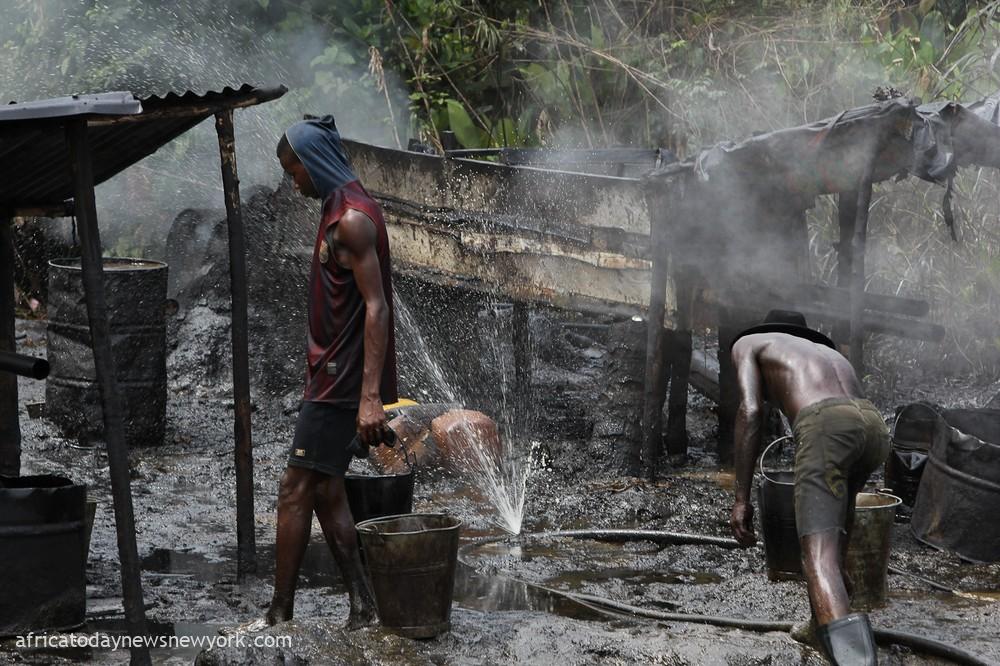The Nigeria Extractive Industries Transparency Initiative (NEITI) once more lays bare the corruption deeply rooted in the nation’s oil and gas sector.
At a staggering 1.249 million barrels per day, Nigeria proudly stands as Africa’s top oil producer, outshining both Libya and Angola in a comparative context.
Regrettably, Nigeria stands alone in the oil ecosystem, grappling with an unprecedented loss of crude due to preventable criminal activities – a consequence primarily of negligence or a lack of political resolve to shift the paradigm.
This underscores a correlation between the nation’s inability to sustain its 200 million hungry populace and the hemorrhaging of millions of barrels of oil through leakages and pipeline vandalism.
Interestingly, these proclivities are actively supported by the international oil companies (IOCs) themselves, undertaking oil exploration and exploitation with the backing of government connections, including security agents and their representatives in the oil sector.
Exacerbating the situation, Nigeria lays claim to Africa’s largest gas reserve, amounting to approximately 200 trillion cubic feet and securing the 9th position worldwide. Despite this wealth, the nation grapples with insufficient road infrastructure, functional healthcare, quality education, and opportunities for job creation for its citizens.
Prompted by the disheartening narrative above, Dr. Orji Ogbonnaya Orji, Executive Secretary of NEITI, reacted by portraying the grim condition of the nation’s oil and gas infrastructure. Simultaneously, he offered a proportional solution to address challenges within the country’s extractive industry.
Delivering a keynote address titled “Pipeline Security, Oil Theft, and the Implications for Economic Growth” at the Nigeria International Pipeline and Security Conference in Abuja last week, Dr. Orji Ogbonnaya Orji emphasized that NEITI’s access to information underscores the critical role of enhancing security around oil and gas pipelines in the ongoing quest to address crude oil theft.
Read also: Oil Theft: Ned Questions Military For Sinking Illegal Vessels
Consequently, oil theft and losses in Nigeria have escalated to a national emergency, posing a severe threat to both oil exploration and exploitation. This crisis carries substantial negative repercussions for economic growth, business prospects, and the profit margins of oil companies.
Orji highlighted, based on NEITI’s 2021 Oil and Gas Industry report unveiled in September, that the sector constituted 72.26% of Nigeria’s overall export and Government’s foreign exchange, contributed 40.55% to government revenue, and generated 19,171 jobs.
This number is notably inadequate, especially when considering the country’s population of 200 million people and the steady stream of thousands of fresh graduates emerging from universities across the states each year.
As a participant in the Special Investigative Panel on Oil Theft and Losses, NEITI reported its insights, pinpointing the predominant methods of oil theft. These involve pipeline clamping, illegal connections (ICs) on major pipelines, exploitation of abandoned oil wellheads, pipeline breakages, and the vandalism of vital national assets for the illegal siphoning of crude into vessels stationed at strategic terminals.
‘The total value of crude losses between 2009 and 2020 is higher than the size of the country’s foreign reserves and almost ten times Nigeria’s oil savings in Excess Crude Account’, the report clarifies.
Responding to this position, Engineer Joseph Ambakaderimo, the Executive Chairman of the Board of Trustees of Community Development Committees (CDC) in Niger Delta Oil and Gas Producing Areas, has urged for a swift collaboration with NEITI. The objective is to carry out sensitization advocacy within oil-bearing communities.
As a co-organizer of the just concluded Nigerian International Pipelines Technology and Security conference, CDC emphasized the need for collaboration with NEITI. Their joint effort would involve advocacy in a town hall format, aiming to educate oil-producing communities about the environmental risks and economic implications of oil theft, thus contributing to the country’s welfare.
Despite NEITI’s valuable contributions, the country faces the unfortunate reality that optimal benefits from its oil and gas resources are yet to be realized. This predicament is fueled by challenges including oil theft, losses from pipeline vandalism, compromise of pipeline integrity, outright sabotage, and overarching insecurity in the Niger Delta region.
It is particularly disheartening that, despite the increasing incidents of oil theft, the Nigerian government has failed to prosecute those responsible for the grave crime of sabotaging the nation’s economy. The tendency is to target individual offenders, while their superiors in the Army, Navy, Civil Defense, and influential politicians are left unaccountable.
The empirical data shared by NEITI highlights that oil theft and losses in Nigeria, covering the period from 2009 to 2020, sum up to 619.7 million barrels of crude, with a value of $46.16 billion or N16.25 trillion. This elucidates the reliance on external borrowing to sustain the economy and meet the citizens’ needs.
